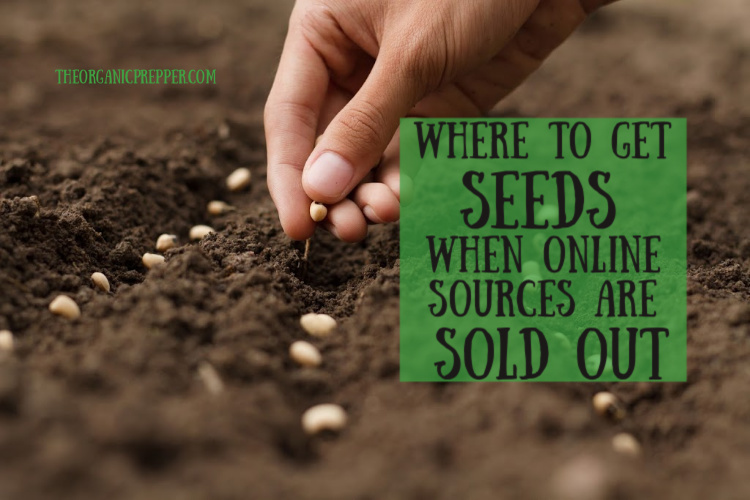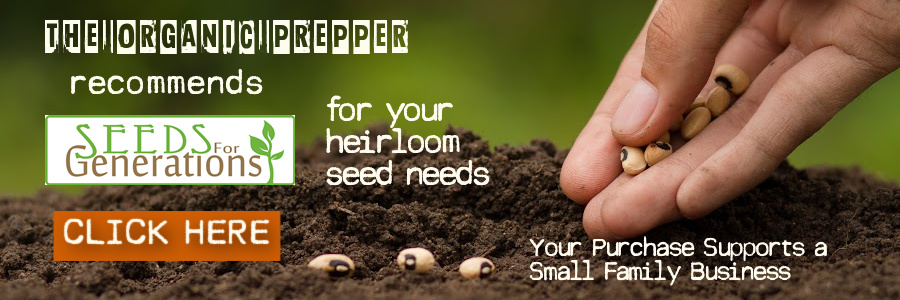If you're new here, you may want to subscribe to my RSS feed. Thanks for visiting!
By Patrice Lewis
With the current shift in the economy, and with supply lines being interrupted all around the nation, there has been a massive – massive! – spike in the number of people interested in growing a garden this spring.
Hundreds of thousands – possibly millions – of new gardens are springing up across the country. Some are large, some are small, and all are important. Some people are calling them Victory Gardens, others are calling them crisis gardens. Even those living in high-rise apartments are planting “Victory Sills,” pots or glasses of water on their windowsills in which herbs or sprouting vegetables are rooting. Whatever the name, cumulatively, they’ll be an important source of fresh produce.
Normally the renaissance in gardening of all sorts would be nothing but good news. However, the surge of interest from both novice and experienced gardeners is stretching seed companies to the limit. Many companies have stopped answering the phones and are putting up online pleas for understanding as they try to handle backorders with limited capacity and inventory.
Here are some other places to get seeds.
If you find yourself unable to order seeds online, here are some alternate sources to consider:
- If you’ve planted non-hybrid seeds in previous years and have saved your seeds for planting this year, congratulations (and be generous with your gardening friends). This is the ultimate way to obtain seeds – by saving your own. Ultimately this is the position in which everyone should be. (Learn more about saving seeds here.)
- Ask your gardening friends for any surplus seeds they can spare. They may also be able to offer helpful planting advice.
- Big box stores may still have seeds. Home improvement stores such as the Home Depot or Lowes, or any large store with a gardening department (Wal-Mart, Ace Hardware, etc.) stock up on seeds this time of year. (The question is whether or not they’ve been cleaned out.)
- If you can’t find seeds in big stores, think small. Local hardware stores, animal feed stores, smaller home and garden stores, grocery stores, even dollar stores often carry seeds.
- Speaking of small, consider purchasing from smaller online seed dealers, often mom-and-pop enterprises such as Seed Treasures (www.seedtreasures.com). They have hand-packaged inventory which larger dealers may lack. Look through classified ads in the back of rural-themed magazines to find small suppliers.
- Check farm supply stores for bulk seeds such as corn, beans, peas, seed potatoes, and onion sets. These can be divvied up among gardening friends and neighbors.
- If you have seed packets that are several years old, don’t hesitate to plant them even if they’re “expired.” Germination rates may be lower than with fresh seeds, but who cares?
- A surprising number of ordinary items from the grocery store can be grown. Some can be purchased from bulk bins, others are packaged. Think in terms of dried beans (any type), popcorn, raw peanuts (do NOT remove the paper skin or they won’t grow), raw sunflower seeds (in the shell), and spice seeds such as poppy seeds, coriander, fennel, and mustard seeds.
- Harvest seeds from grocery store produce. Tomatoes, bell peppers, cucumbers, zucchini, melons, fresh corn (let the kernels dry on the cob first) – all have seeds which can be planted. Of course, you won’t know if the produce is hybrid or not, but plant them anyway. What do you have to lose? The worst that can happen is the resulting plant may not be identical to its parent plant.
- Sprout new plants from grocery-store produce, often from the leftover root ends. This method often requires nothing more than a jar of shallow water (into which the root end is placed) and a sunny windowsill. People are growing leeks, green onions, cabbage, lettuce, celery, bok choy, mint, basil, rosemary, and fennel fronds. Change the water when it gets cloudy, but otherwise just let the new plants grow. Commercial potatoes and sweet potatoes are often treated with a sprouting inhibitor, but many people have fine success in growing them anyway (make sure each planted piece has at least one eye). People have even sprouted avocado pits, raw coffee beans, and pineapple tops.
- Try seed exchanges. These are non-profit or volunteer groups of passionate gardeners who conserve and share seeds. Seed exchanges can be local, regional, or national.
It goes without saying these alternate sources may not provide you with exactly the varieties you were looking for, but now is not the time for tunnel vision.
Nor can you be too purist about planting only non-hybrid or heirloom varieties. Most (though not all) commercial seed packets you find in box stores will be hybrids. Right now, this doesn’t matter. Buy what seeds you can. Also, while sometimes seeds from hybrid plants are sterile, many times they’ll grow; they just won’t produce the same kind of plant as its parent plant. But in emergency times, the important thing is to grow food, so plant your hybrid seeds and see what happens. You can scout around for non-hybrid seeds later.
If you have the room and the seeds, don’t hesitate to plant something that’s not your favorite food; you might be surprised how many others are willing to take the resulting fresh produce off your hands (and perhaps swap you for something you DO like).
It’s time for everyone to tap into their Inner Gardener and “sow the seeds of victory,” to use the old slogan. Now get those seeds in the ground and see what happens.
About Patrice
Patrice Lewis is pleased to announce the availability of the complete collection of 52 Country Living Series ebooklets, representing over 17 years of homesteading experience. Subjects include preparedness, gardening, frugality, rural skills, food preservation, and more. Click this link for details.

















14 Responses
Some seed companies are offering last year’s seeds for “victory gardens”. High Mowing Seeds has this for Vermont residents: https://nofavt.org/blog/create-resilience-garden
I have also seen a few high schools in my area partnering with local stores to give away a similar “victory garden” packet to anyone who wanted one. One offering even included small pots, bags of soil and instructions for new gardeners.
All were found on local Facebook groups, so even if you do not normally use social media it might be a good time to quietly search and see what others are discussing and sharing.
I recently was looking to make a large purchase of heirloom seeds and found that most all of the companies I have purchased from in the past were low on or completely out of stock. I then came across Anderson Seed and Garden in Logan UT. They had a wide variety of seeds available in stock at very reasonable prices. We try to keep a minimum of a two year supply of seeds on hand at all times so we placed an order with them large enough to restock our seed supply. It shipped the next day. The only slight issue I had was with their packaging in paper sleeves and paper bags, but we had planned on breaking the seeds down into smaller packages anyway and vacuum seal them.
We also use a local seed & feed store that sells bulk seed by the ounce and pound but their variety is limited. Purchasing in small commercially packaged seeds is very expensive considering the small amount in the package.
I just finished purchasing my seeds online from https://www.trueleafmarket.com/ which has been open and supplying seeds throughout the pandemic. Be aware that fulfillment times are a little slower, and things are starting to sell out, but they had everything that I needed this year. I have no relationship with this company other than a happy customer.
Our local library has a seed collection to which gardeners have contributed their excess seeds. In past years we have also held a plant/seed swap night.
For those of us in Florida try
https://flseeds.com/
Thank you so much for passing this along!
Luckily I had the good sense to 0rder seeds early. Here in SE Arizona we are fortunate to have a good many seeds and varieties. But also they have become kinda pricey. If I can help anybody out on seeds,let me know.
If you want to get started harvesting and preserving your own seed I suggest Suzanne Ashworth’s book “Seed to Seed”. It covers everything you need to know to get started.
You can also buy starts (small plants) you can get heirloom
They cost a bit more but you can get a deep discount if you live near a nursery that does this as they have no sales and will mainly do pick up cash sales.
We also have local gardening clubs they have stuff for sale.
You can grow tomatoes from sliced heirloom tomatoes just planted so can most potatoes though they are treated with something in store to stop sprouting so go organic.
Also learn about grafting you can use aspen and alder as root stock and graft on fruit branches. Takes a few years bUT free if you are good with a knife and have a fruit tree where you can get cuttings.
Have an orchard with lots fruit trees from doing that. One special tree has pear cherry 3 different apples and plums on it.
I ordered from Seed Treasures a few weeks ago. They turned my order around very quickly! I enjoyed reading through their website (about the different varieties they grow here in MN).
Seed Treasures does have an enjoyable website & appears to be a lovely family business. Thanks for passing their name along.
I also checked the rareseeds website this morning. A lot there is sold out but it is easy to at least see what IS available.
Etsy has seeds for sale! Regular ones and rare ones both.
You can also check out https://www.bestcoolseeds.com/collections/all for seeds that work in cold climates (the seed producer produces varieties that will grow in Alaska – but not *just* in Alaska).
I found seeds last week on Etsy. A small shop had a good selection of heirloom and USPS delivered them 5 days later. My local Agway and TSC have been sold out for awhile. Agway said they have gotten seeds in 7 times so far but keep selling out fast.
We just got our seed order from Morgan County seed company. They are Amish owned and located in Missouri. https://www.morgancountyseeds.com/ They are a small seed company, but a very good one in our opinion. We bought in bulk some seed such as sweet corn, field corn, peas and beans. They sell also by the packet, ounce, 1/4 lb., 1/2 lb., 1-lb., and 5 lb. increments on a lot of seeds. The seeds are always fresh. Our germination rate on all our seeds we planted from Morgan County Seeds was fantastic. I made a huge seed order for this fall as well as all of next year. They had everything I ordered. Their prices are super reasonable. 5lbs of Improved Golden Bantam sweet corn is $15.50 and the same amount of Trucker’s Favorite field corn was $9.95. Most other places the prices are doubled or more. We plant open pollinated heirloom seed, so we also save seed. We’ve had excellent results from their seed and the ones we save from year to year. Hope this helps if you’re looking for seed right now. As of the order date last week, they still had all the seed selections I made. I made selections on a wide variety of vegetable seed. Btw their seed in non-gmo and not affiliated with Monsanto. We asked to be sure.